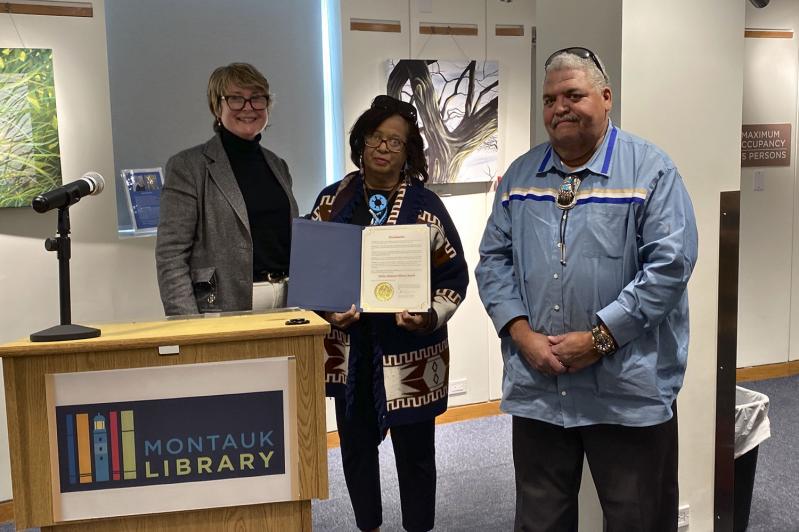“In 1910, New York State Judge Blackmar ruled that the Montaukett Tribe no longer existed, yet the Montauketts remain resilient and continue to seek rightful recognition,” read the proclamation that East Hampton Town Supervisor Kathee Burke-Gonzalez offered to Chief Robert Pharaoh and Sandi Brewster-walker on Tuesday.
She went on to praise “the Montaukett Tribe and all Native American people for their history, heritage, and continued contributions.”
“I just want to thank East Hampton for recognizing us,” said Ms. Brewster-walker, “and our long history on the East End. And also explain to people that we weren’t only in the town of East Hampton.” The Montauketts, she said, “stretched from Orient Point and Montauk all the way to Hempstead, jumping over the Shinnecock Indian Nation.”
“We have clustered all over the Island, and we’re trying to bring that to light with people.”
Ms. Brewster-walker is to meet with the office of the New York Secretary of State tomorrow. “Hopefully we can iron everything out, and get on with our lives.” Unlike East Hampton Town, New York State still does not recognize the tribe.
Lance Gumbs, current vice chairman of the Shinnecock Nation, who was chairman during that tribe’s fight for federal recognition, spoke to the town board after Ms. Brewster-walker.
“Thank you to the board for this acknowledgement of the Montauketts,” he said. “This is something that we at Shinnecock support fully, their state recognition that they’re working on. . . . What happened back in 1910 was a true travesty of justice and in violation of federal laws. We feel that for the Montauks to obtain their state recognition is a very important process for the history of Long Island, and especially for us on the East End. We endorse their state recognition.”
“My great-great-grandmother was one of the ones that testified on behalf of the Montauketts at the time when that atrocious decision was made,” he continued. “I’m not sure still to this day, how one person can just, through the stroke of a pen, erase a whole people, but it happened. This has been a long fight to regain it. We are just happy that the Town of East Hampton and the board is recognizing the Montauks for who they are, as the original first contact people here on the East End of Long Island.”
With that, the visitors sang out “The Peltier Song,” in honor of Leonard Peltier, a Native American activist who has been incarcerated since 1976, following a controversial trial, at a maximum-security federal penitentiary in Florida, serving life terms for the murder of two F.B.I. agents on a South Dakota reservation.




